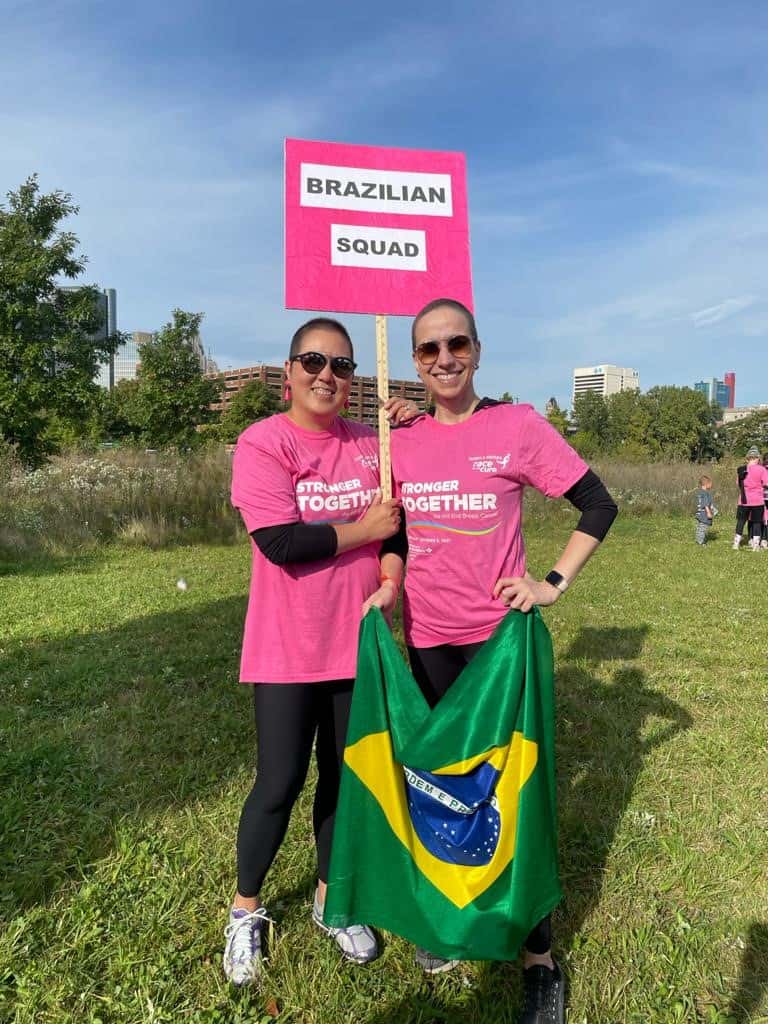
When Juliana Carvalho felt a lump in her left breast in February 2021, she reached out to her doctor. She was soon diagnosed with stage 2 breast cancer. This is her story in her own words.
I was living in the U.S., away from my family in Brazil. My son was almost 5 months old at the time. Due to the pandemic, I had no family with me when my son was born so I was navigating life on my own.
After I felt a lump in my left breast, I reached out to my doctor. After an infinite series of exams, I got my diagnosis: stage 2 breast cancer. I received the news through the hospital app on my phone, alone at home. The only thought that crossed my mind was I had to have this “thing” out of my body as soon as possible. I needed to see my son grow up.
My treatment began, including chemotherapy and surgery. I remember my doctors telling me that my chances of recovery were good. Despite my mother not being with me for the birth of my son, I was able to bring her to the U.S. at the time of my treatment. When she arrived, I had already had my first chemo treatment and had shaved my head. I was so happy to have her with me during treatment and for my first Mother’s Day in May 2021.
In July 2021, after five rounds of chemotherapy, I walked into my doctor’s office for a follow-up. My doctor informed me that my tumor had shrunk and was no longer visible on an ultrasound. I remember celebrating this victory and feeling so thankful that my body had responded to the treatment.
Though the tumor shrunk, I decided to go through with a bilateral mastectomy to reduce my risk of recurrence. I was very skinny and weak right before the surgery and was really scared of not coming back home to my son. In this moment, my faith came on so strong. I prayed to God to bring me back from the surgery.
My surgery was in August 2021, and after the surgery, I was considered cancer-free.
My journey with breast cancer gave me so much wisdom and I went deep on rediscovering who I was after it all. I am committed to sharing the lessons I have learned:
- Trust your intuition, know your body. I discovered my lump, reached out to my doctor and was treated in the early stages, saving my life.
- Have at least one good friend, family member or therapist you can call anytime, day or night. I was blessed with a handful of great and loving people around me throughout my journey.
- Strengthen your faith/beliefs: Due to COVID-19, there were moments when I was not able to have anybody with me during chemotherapy or post-surgery. I’m very strong in my faith and never felt alone. I had some complications right after surgery and needed to return to the operating room. I remember a nurse came to me and asked if I was afraid or if I needed any medication to calm down. I was scared, but I was filled with peace because I knew I was not alone. No matter what your beliefs are, have something to help your soul to be strong.
- Take care of your body. We never know how much we’ll need our body. Before all of this happened to me, I had healthy habits. When breast cancer happened to me, I was angry and began to wonder why this had happened to me since I am so healthy. Lately, I realized that my strong body that I built throughout the years helped me recover from my battle.
- Fear of recurrence exists. It is always here, but I remind myself that I’ve been on top of every appointment, I don’t miss check-ups and I talk to my doctor when I notice any changes.
- Find ways to help others. A smile, a hug, a word, a meal, a cup of coffee. It always comes back to you somehow.
- And, finally, celebrate every victory, tiny or huge.
Statements and opinions expressed are that of the individual and do not express the views or opinions of Susan G. Komen. This information is being provided for educational purposes only and is not to be construed as medical advice. Persons with breast cancer should consult their healthcare provider with specific questions or concerns about their treatment.



